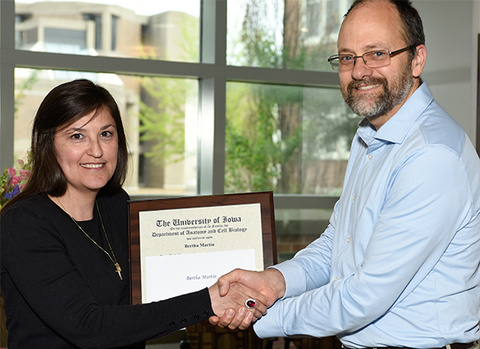
Current graduate student Bertha Martin recently participated in the National Scientific Mentoring and Diversity Program (SMDP) Biotech, a one-year career mentoring program that pairs ethnically diverse students and early career researchers with industry mentors.
These mentors work at companies in medical technology, biotechnology, and consumer healthcare industries. All participating scholars attend a five-day training session to learn about career opportunities in industry, receive career development coaching, and attend a major industry conference.
Learn more about the program from Martin’s perspective and why she decided to participate in SMDP.
What is SMDP?
SMDP is a program that provides scholars a year-long mentoring and career development for racially and ethnically under-represented graduate and postdoctoral students. The goal of SMDP is to increase the presence of these under-represented groups in biotech industry positions by pairing the scholars with industry mentors.
During training the scholar learns about opportunities within the industry and career development coaching from past scholars, some who after this experience are now mentors for SMDP selected scholars. Additionally, the scholar attends a major industry biotech convention.
Following these training sessions the mentor-scholar meetings are mostly held virtually. SMDP can be viewed as a bridge program for diverse students (baccalaureate, master’s, or doctoral) to industry.
Why did you decide to participate in SMDP?
I decided to participate in SMDP, a program managed by the International Center for Professional Development (ICPD), because of its commitment to actively increase first-generation and under-represented groups in life sciences, medical technology, and consumer healthcare industries through mentoring and career development coaching.
This experience will allow me to expand my career options and build my networks with other professionals, by implementing the skills and knowledge acquired during my PhD.
How do you think SMDP will benefit your future?
SMDP will benefit me by enhancing my professional career through the mentorship relationship we will build with our matched industry mentors. Being an SMDP scholar will open other opportunities to collaborate with other scientists and talented minds outside of academia. These collaborations may foster future projects between graduate institutions and biotech companies, potentially bridging advancement of science and therapeutic development to target rare diseases.
What are you currently studying at Iowa?
I am currently pursuing a doctoral degree in the Department of Anatomy and Cell Biology. The focus of my project is investigating the role of complement system proteins in ultra-rare complement-mediated renal diseases, in the Molecular Renal Research Laboratories (MORL).
What was the most important thing you learned from this experience?
My main takeaway from participating in this program has been perseverance, determination, and independence. As a graduate student investigating is not straightforward and many times not a smooth trajectory.
Describe what you did during the last year in this program?
During the last year in the program I served as the Anatomy and Cell Biology Graduate Student body president. Additionally, I attended the Data Intensive Biology Summer Institute (DIBSI) at the University of California, Davis.
This gave me the opportunity to learn about beginning the process of writing scripts using R. My supervisor, Dr. Richard Smith, and I, updated the chapter Dense Deposit Disease/ Membranoproliferative Glomerulonephritis (MPGN) II to C3 Glomerulopathy (C3G).
C3G became the accepted term at the 2012 first C3G meeting, the umbrella term for the complement-mediated renal diseases, which is the basis of my research. In this update, we added the most current information about the second disease, C3 Glomerulonephritis (C3GN) and current disease status biomarkers and functional tests, since the last update in 2011.
Learn more about Bertha Martin.